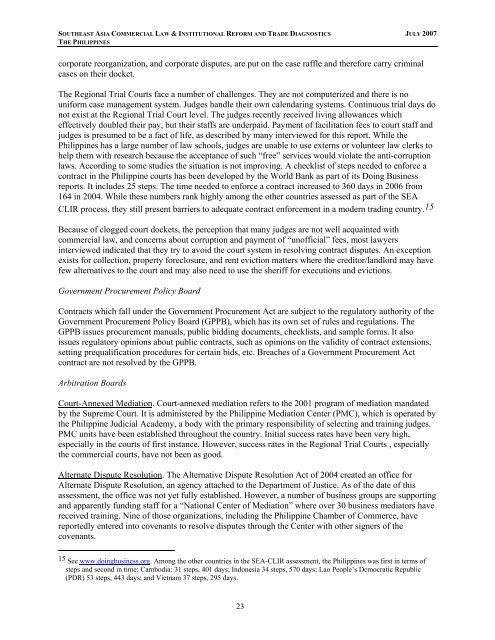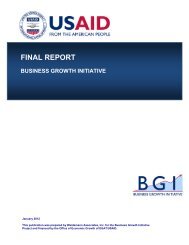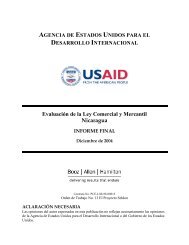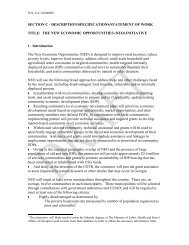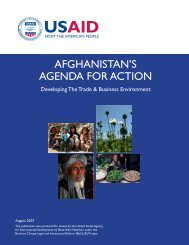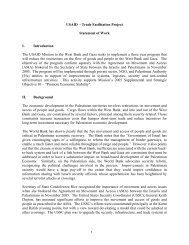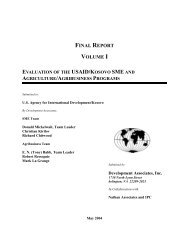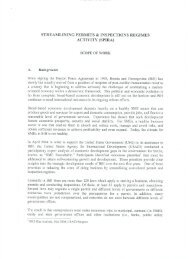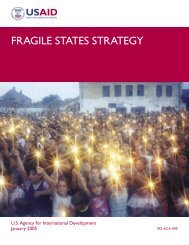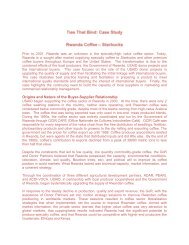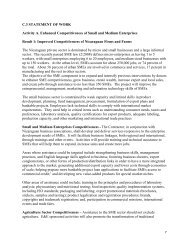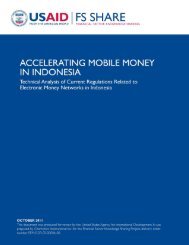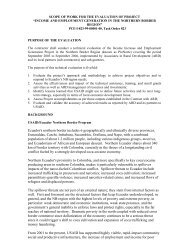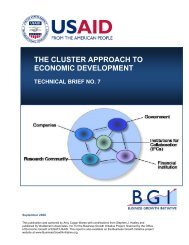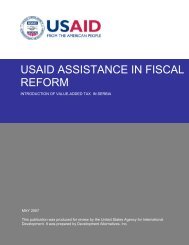The Philippines - Economic Growth - usaid
The Philippines - Economic Growth - usaid
The Philippines - Economic Growth - usaid
You also want an ePaper? Increase the reach of your titles
YUMPU automatically turns print PDFs into web optimized ePapers that Google loves.
SOUTHEAST ASIA COMMERCIAL LAW & INSTITUTIONAL REFORM AND TRADE DIAGNOSTICS JULY 2007<br />
THE PHILIPPINES<br />
corporate reorganization, and corporate disputes, are put on the case raffle and therefore carry criminal<br />
cases on their docket.<br />
<strong>The</strong> Regional Trial Courts face a number of challenges. <strong>The</strong>y are not computerized and there is no<br />
uniform case management system. Judges handle their own calendaring systems. Continuous trial days do<br />
not exist at the Regional Trial Court level. <strong>The</strong> judges recently received living allowances which<br />
effectively doubled their pay, but their staffs are underpaid. Payment of facilitation fees to court staff and<br />
judges is presumed to be a fact of life, as described by many interviewed for this report. While the<br />
<strong>Philippines</strong> has a large number of law schools, judges are unable to use externs or volunteer law clerks to<br />
help them with research because the acceptance of such “free” services would violate the anti-corruption<br />
laws. According to some studies the situation is not improving. A checklist of steps needed to enforce a<br />
contract in the Philippine courts has been developed by the World Bank as part of its Doing Business<br />
reports. It includes 25 steps. <strong>The</strong> time needed to enforce a contract increased to 360 days in 2006 from<br />
164 in 2004. While these numbers rank highly among the other countries assessed as part of the SEA<br />
CLIR process, they still present barriers to adequate contract enforcement in a modern trading country. 15<br />
Because of clogged court dockets, the perception that many judges are not well acquainted with<br />
commercial law, and concerns about corruption and payment of “unofficial” fees, most lawyers<br />
interviewed indicated that they try to avoid the court system in resolving contract disputes. An exception<br />
exists for collection, property foreclosure, and rent eviction matters where the creditor/landlord may have<br />
few alternatives to the court and may also need to use the sheriff for executions and evictions.<br />
Government Procurement Policy Board<br />
Contracts which fall under the Government Procurement Act are subject to the regulatory authority of the<br />
Government Procurement Policy Board (GPPB), which has its own set of rules and regulations. <strong>The</strong><br />
GPPB issues procurement manuals, public bidding documents, checklists, and sample forms. It also<br />
issues regulatory opinions about public contracts, such as opinions on the validity of contract extensions,<br />
setting prequalification procedures for certain bids, etc. Breaches of a Government Procurement Act<br />
contract are not resolved by the GPPB.<br />
Arbitration Boards<br />
Court-Annexed Mediation. Court-annexed mediation refers to the 2001 program of mediation mandated<br />
by the Supreme Court. It is administered by the Philippine Mediation Center (PMC), which is operated by<br />
the Philippine Judicial Academy, a body with the primary responsibility of selecting and training judges.<br />
PMC units have been established throughout the country. Initial success rates have been very high,<br />
especially in the courts of first instance. However, success rates in the Regional Trial Courts , especially<br />
the commercial courts, have not been as good.<br />
Alternate Dispute Resolution. <strong>The</strong> Alternative Dispute Resolution Act of 2004 created an office for<br />
Alternate Dispute Resolution, an agency attached to the Department of Justice. As of the date of this<br />
assessment, the office was not yet fully established. However, a number of business groups are supporting<br />
and apparently funding staff for a “National Center of Mediation” where over 30 business mediators have<br />
received training. Nine of those organizations, including the Philippine Chamber of Commerce, have<br />
reportedly entered into covenants to resolve disputes through the Center with other signers of the<br />
covenants.<br />
15 See www.doingbusiness.org. Among the other countries in the SEA-CLIR assessment, the <strong>Philippines</strong> was first in terms of<br />
steps and second in time: Cambodia: 31 steps, 401 days; Indonesia 34 steps, 570 days; Lao People’s Democratic Republic<br />
(PDR) 53 steps, 443 days; and Vietnam 37 steps, 295 days.<br />
23


